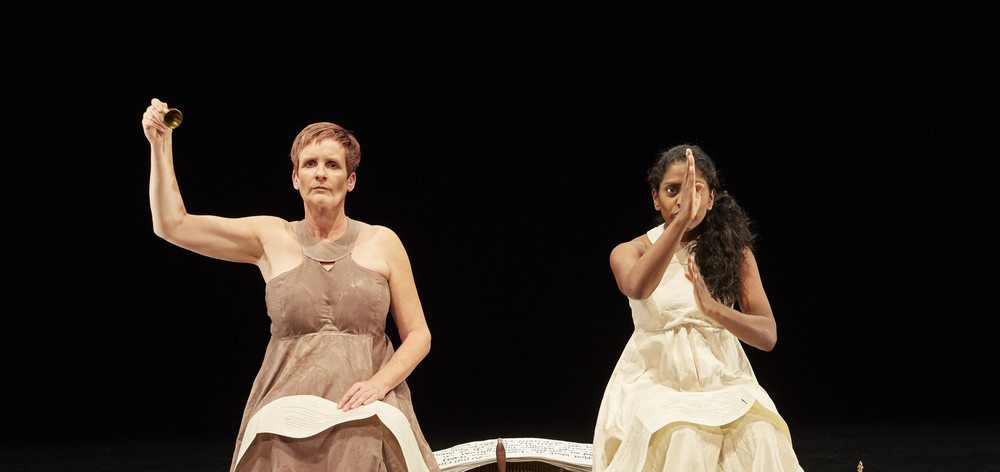Review: Sue MacLaine company presents ‘Can I start again please?’
How do we speak about the unspeakable? How do we communicate when words aren’t enough? How can we find a language for trauma? Told simultaneously in spoken English and British Sign Language ‘Can I Start Again Please’ is an extraordinary piece about surviving, expressing, deconstructing sexual abuse.
an extraordinary piece about surviving, expressing, deconstructing sexual abuse.
The performers Sue MacLaine and Nadia Nadarajah sit silently, gracefully, eyeing the audience, aware but without judgement. They are dressed resplendently in long grey and white dresses, a long length of folded paper rests between the two, bells of various sizes lie within reaching distance. They make a striking pair.
They stand occasionally, the paper spooling down to their feet, but apart from this neither move from their chairs for the hour-long performance. In general, MacLaine speaks and Nadarajah signs, both at once, sometimes one begins before the other, but it’s not clear who is translating who and deliberately so. This could be Nadarajah’s story, MacLaine’s story, or neither. It could be our story.
This could be Nadarajah’s story, MacLaine’s story, or neither. It could be our story.
The piece reveals itself slowly, through inference and gesture, translation and mistranslation. The success and failure of how we communicate to each other features throughout. They pause for ten, twenty, thirty seconds in still silence “to allow for that to be translated”, not translated from spoken into sign or vice versa, but for our brains to collect, process and interpret what we’ve just seen and heard. “Are you following?” they ask, “I am speaking directly to you. Do you understand? I want you to show me, I want you to show everyone here.”
This production is not one you can just let wash over you. The script penned by MacLaine is at times uncompromisingly dense, grappling with complex philosophical ideas, entreating response, begging its audience to understand. It utilises philosophy, anecdote and riddle as frames through which it hints at trauma and pain.
uncompromisingly dense, grappling with complex philosophical ideas, entreating response, begging its audience to understand.
They deconstruct what it means to assume, to make presumptions and inferences. They celebrate the beauty of intuition whilst bemoaning its failures. The piece wants you to think seriously about silence and speech, communication and misunderstanding, highlighting these as particular concerns for survivors of abuse. “Do you understand? Why aren’t you listening?” they call, “Why aren’t you listening to me?”
It never names its subject matter explicitly. A deep compassion runs through the production, there’s a strong sense of safety, like a conversation with a friend. MacLaine describes her impetus for the piece being a reaction against the “misery memoir”, bemoaning narratives of child sexual abuse that are either focused on perpetrators or framed in an exploitative way; photographs of little girls holding upside-down teddy bears; the “No Daddy no” tale.
In response, the piece re-frames those narratives in a way that doesn’t re-traumatise its audience. ‘Can I Start Again Please’ wrestles with the impossibility of talking about a traumatic experience by scrutinizing the efficacy of communication itself.
It wants to bring us with it. “We’re co-constructing meaning, us here today” they say. As the two languages clash and compliment each other, the beautifully choreographed movement, the evocative poetry and the affecting silence combine to create something greater than the sum of its parts.
“Whereof one cannot speak, thereof one must be silent.” They say, citing Wittgenstein yet again. When we have nothing to say, we should be silent. Or perhaps, when we don’t have the words to speak, we must be silent.
I have a feeling though, ‘Can I Start Again Please’ is beginning to develop a new, third option to Wittgenstein’s declaration. MacLaine is giving those survivors a safe space where silence is no longer the only option, a new language through which they can start to speak again. One can only hope she succeeds.
‘Can I start again please’ was performed at Warwick Arts Centre on Wednesday 21 Octobeer 2015.

Comments (1)